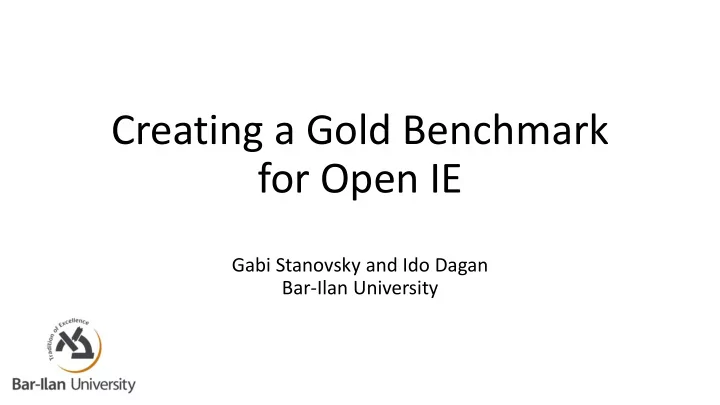

Creating a Gold Benchmark for Open IE Gabi Stanovsky and Ido Dagan Bar-Ilan University
In this talk • Problem : No large benchmark for Open IE evaluation! • Approach • Identify common extraction principles • Extract a large Open IE corpus from QA-SRL • Automatic system comparison • Contributions • Novel methodology for compiling Open IE test sets • New corpus readily available for future evaluations
Problem: Evaluation of Open IE
Open Information Extraction • Extracts SVO tuples from texts • Barack Obama, the U.S president, was born in Hawaii → (Barack Obama, born in , Hawaii) • Obama and Bush were born in America → ( Obama, born in , America), (Bush, born in , America) • Useful for populating large databases • A scalable open variant of Information Extraction
Open IE: Many parsers developed • TextRunner (Banko et al., NAACL 2007) • WOE (Wu and Weld, ACL 2010) • ReVerb (Fader et al., 2011) • OLLIE (Mausam et al., EMNLP 2012) • KrakeN (Akbik and Luser, ACL 2012) • ClausIE (Del Corro and Gemulla, WWW 2013) • Stanford Open Information Extraction (Angeli et al., ACL 2015) • DEFIE (Bovi et al., TACL 2015) • Open-IE 4 (Mausam et al., ongoing work) • PropS-DE (Falke et al., EMNLP 2016) • NestIE (Bhutani et al., EMNLP 2016)
Problem: Open IE evaluation • Open IE task formulation has been lacking formal rigor • No common guidelines → No large corpus for evaluation • Post-hoc evaluation: • Annotators judge a small sample of their output → Precision oriented metrics → Figures are not comparable → Experiments are hard to reproduce
Previous evaluations Hard to draw general conclusions!
Solution: Common Extraction Principles Large Open IE Benchmark Automatic Evaluation
Common principles 1. Open lexicon 2. Soundness “Cruz refused to endorse Trump” ReVerb: (Cruz; endorse ; Trump) OLLIE: (Cruz; refused to endorse ; Trump) 3. Minimal argument span “Hillary promised better education, social plans and healthcare coverage” ClausIE: (Hillary, promised , better education), (Hillary, promised , better social plans), (Hillary, promised , better healthcare coverage)
Solution: Common Extraction Principles Large Open IE Benchmark QA-SRL Open IE Automatic Evaluation
Open IE vs. traditional SRL Open IE Traditional SRL Open lexicon V X Soundness V V Reduced arguments V X
QA-SRL • Recently, He et al. (2015) annotated SRL by asking and answering argument role questions Obama, the U.S president, was born in Hawaii • Who was born somewhere? Obama • Where was someone born ? Hawaii
Open IE vs. SRL vs. QA QA-SRL SRL QA- SRL isn’t limited to a lexicon Open IE Traditional SRL QA-SRL Open lexicon V X V Consistency V V V Reduced arguments V X V QA-SRL format solicits reduced arguments (Stanovsky et al., ACL 2016)
Converting QA-SRL to Open IE • Intuition: generate all independent extractions • Example: • “ Barack Obama , the newly elected president , flew to Moscow on Tuesday ” • QA-SRL: • Who flew somewhere? Barack Obama / the newly elected president • Where did someone fly ? to Moscow • When did someone fly ? on Tuesday OIE: (Barack Obama, flew , to Moscow, on Tuesday) (the newly elected president, flew , to Moscow, on Tuesday) Cartesian product over all answer combinations • Special cases for nested predicates, modals and auxiliaries
Resulting Corpus • Validated against an expert annotation of 100 sentences (95% F1) • 13 times bigger than largest previous OIE corpus (ReVerb)
Solution: Common Extraction Principles Large Open IE Benchmark Automatic Evaluation
Evaluation • We evaluate 6 publicly available systems 1. ClausIE 2. Open-IE 4 3. OLLIE 4. PropS IE 5. ReVerb 6. Stanford Open IE • Soft matching function to accomodate system flavors
Low recall: Evaluation Missed long-range dep, pronoun resolution Stanford ’ s performance: Probability of 1 to most extractions “ Duplicates ” hurt precision
Caveat • OIE parsers didn’t tune for our corpus Evaluation may not reflect optimal performance • More importantly – using our corpus for future system development
Conclusion • New benchmark published • https://github.com/gabrielStanovsky/oie-benchmark • 13 times larger than previous benchmarks • First automatic and objective OIE evaluation • Novel method for creating OIE test sets for new domains Thanks for listening!
Recommend
More recommend